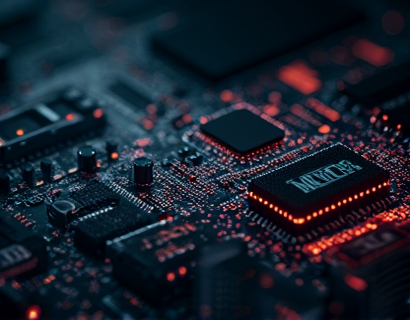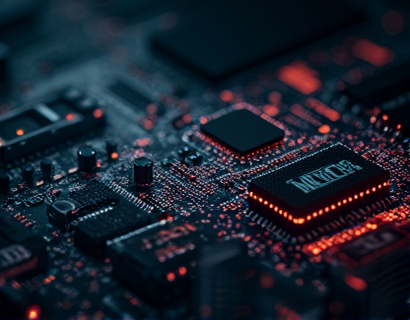Crypto-Powered Productivity: Harnessing AI for Next-Gen App Solutions
The intersection of cryptocurrency and artificial intelligence (AI) is giving rise to a new era of productivity tools. This innovative fusion is redefining how we approach daily tasks and workflows, offering solutions that are not only efficient but also deeply integrated with the digital economy. This article delves into the emerging platforms that leverage these technologies to create next-generation app solutions, tailored for tech enthusiasts and early adopters who are eager to embrace the future.
Understanding the Synergy Between Cryptocurrency and AI
The combination of cryptocurrency and AI is more than just a technological curiosity; it represents a powerful synergy that can drive significant advancements in productivity tools. Cryptocurrency provides a decentralized, secure, and transparent means of transaction and data storage, while AI brings intelligent automation and personalized user experiences. When these two elements are combined, the result is a robust framework for developing applications that are both secure and highly adaptive to user needs.
Decentralized Applications (DApps) for Enhanced Productivity
One of the most promising outcomes of merging cryptocurrency with AI is the development of Decentralized Applications, or DApps. These applications run on a blockchain network, ensuring that data is distributed across multiple nodes rather than stored in a central location. This decentralization not only enhances security but also increases reliability and transparency. For productivity, DApps can offer a range of benefits, from secure file sharing and collaboration tools to decentralized task management systems.
For instance, a DApp designed for project management can utilize AI to predict project timelines, allocate resources efficiently, and even adjust schedules based on real-time data. The decentralized nature of the app ensures that all team members have access to the most up-to-date information without the risk of data breaches or single points of failure.
Smart Contracts for Automated Workflows
Smart contracts, self-executing contracts with the terms directly written into code, are another key component of this technological fusion. In the context of productivity, smart contracts can automate routine tasks and workflows, reducing the need for manual intervention and minimizing errors. For example, a smart contract can be programmed to release payment to a freelancer once a milestone is achieved, verified by AI-driven metrics that ensure the work meets the agreed-upon standards.
This automation not only saves time but also builds trust and accountability in transactions. The use of AI in smart contracts can further enhance their functionality by incorporating complex logic and conditional statements, making them more versatile and powerful tools for streamlining business processes.
AI-Driven Personalization in Productivity Tools
AI's ability to analyze vast amounts of data and learn from user behavior makes it an ideal partner for creating personalized productivity solutions. By integrating AI into app solutions, developers can create tools that adapt to individual user preferences and work styles. For example, a smart calendar app powered by AI can learn a user's scheduling habits and suggest optimal times for meetings, taking into account factors like productivity peaks and time zone differences.
Such personalized experiences are not only more user-friendly but also more effective, as they are tailored to the specific needs of each user. This level of customization is particularly valuable in a world where one-size-fits-all solutions often fall short.
Enhanced Security Through Cryptographic Techniques
Security is a paramount concern in the digital age, and the use of cryptocurrency in app development brings inherent security benefits. Cryptographic techniques ensure that data is encrypted both in transit and at rest, making it extremely difficult for unauthorized parties to access sensitive information. This is particularly important for productivity tools that handle confidential business data or personal information.
Moreover, the use of blockchain technology ensures that transactions and data modifications are immutable, providing a tamper-proof record. This level of security is crucial for building trust in digital tools and services, especially among early adopters who are often more security-conscious.
Interoperability and Ecosystem Integration
Another significant advantage of crypto-powered productivity tools is their interoperability. Blockchain-based platforms can facilitate seamless integration between different apps and services, creating a cohesive ecosystem where data and functionalities can be shared easily. This interoperability is achieved through standardized protocols and APIs that ensure different systems can communicate and work together smoothly.
For users, this means a more unified and efficient digital experience, where they can switch between tools without the hassle of data silos or compatibility issues. Developers can also build on existing infrastructure, accelerating the development of new applications and services.
Case Studies: Real-World Applications
To better understand the practical applications of crypto-powered AI in productivity, let's look at a few real-world examples. One notable platform is a decentralized cloud storage service that uses AI to optimize data storage and retrieval. The AI algorithm analyzes usage patterns and automatically allocates storage resources, ensuring that users have quick access to their files while minimizing costs.
Another example is a collaborative workspace app that leverages blockchain for secure file sharing and AI for intelligent task assignment. The app uses AI to monitor team performance and suggest optimal task distributions based on individual strengths and availability, all while ensuring that files are stored securely and access is controlled through smart contracts.
Challenges and Considerations
While the potential of crypto-powered AI in productivity tools is vast, there are several challenges and considerations to keep in mind. One of the primary challenges is the regulatory landscape, as the use of cryptocurrency is still evolving and subject to varying laws and regulations across different regions. Developers must navigate these complexities to ensure compliance and avoid legal issues.
Another consideration is the technical complexity involved in integrating blockchain and AI technologies. Building robust and scalable solutions requires expertise in both areas, which can be a barrier for some developers. However, as the ecosystem matures, more tools and frameworks will become available, making it easier to develop these advanced applications.
The Future of Productivity: Embracing the Next Generation
The convergence of cryptocurrency and AI is not just a trend but a fundamental shift in how we approach productivity and digital workflows. By leveraging the strengths of both technologies, developers are creating tools that are more secure, efficient, and personalized than ever before. For tech enthusiasts and early adopters, this represents an exciting opportunity to be at the forefront of a new digital revolution.
As the technology continues to evolve, we can expect to see even more innovative applications that push the boundaries of what is possible. The future of productivity is here, and it is powered by the combination of cryptocurrency and artificial intelligence.









































